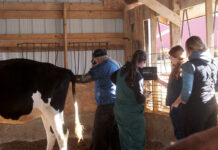SALEM, Ohio — At least seven years of legislative and bureaucratic wrangling over country-of-origin labeling, or COOL, continues, even as the new mandatory program takes effect this week.
As of Sept. 30, 2008, country-of-origin labeling is required at the retail level for all beef, pork, lamb, goat, chicken, fresh and frozen fruit and vegetable, peanut, pecan, ginseng and macadamia nuts products.
Since April 2005, country-of-origin labeling and the method of production have been required for fish and shellfish covered commodities sold at retail.
Restaurants and cafeterias are exempt, as are ingredients in a processed food item, like roasted peanuts, dried fruit, breaded chicken tenders or a salad mix. Retail locations that buy/sell less than $230,000 of perishable farm commodities per year are also exempt.
Country-of-origin labeling was authorized by Congress in both the 2002 and 2008 farm bills. (You can read answers to COOL frequently asked questions in this USDA .pdf, and answers to livestock auction owners’ questions at this Livestock Marketing Association page.)
‘Mixed origin.’
The latest brouhaha stems from the USDA’s interpretation of COOL.
The USDA’s Agricultural Marketing Service issued guidance Sept. 11 that said meat products from livestock “born, raised and slaughtered in the United States” can be labeled as “mixed origin,” or as products from the U.S., Canada and Mexico.
That led to the announcement by several large beef packers of their intent to label all beef products under the multiple products category, such as “Product of the United States, Canada and Mexico,” ignoring the exclusively U.S. born, raised and processed category. And that, some say, was the whole point of country-of-origin labeling in the first place.
Packers and processors said they simply don’t have the physical capacity to segregate those animals in the handling and processing steps.
Close the loophole
Opponents are hoping the interim final rule will be clarified to strike down that guidance.
“USDA has created a loophole big enough to drive a truck through, violating the spirit, letter and intent of the law, and deceiving consumers who have consistently shown support for buying U.S. products,” said Tom Buis, president of the National Farmers Union.
He said the farm bill’s compromise agreement created a category that specifically labeled products exclusively born, raised and processed in the U.S. as a U.S. product.
The American Farm Bureau Federation also expressed members’ dismay over that interpretation in a letter dated Sept. 26 to the Agricultural Marketing Service. It called for a nationwide meat labeling survey this year to determine “how much product, what product and where exclusively U.S. labeled meat is being sold.”
Senate not happy
A letter from 32 U.S. senators from both parties also blasted the USDA’s interpretation, saying “Consumers and producers are expecting to see exclusively U.S. origin product labeled as such.”
If the interim rule is not clarified on the issue, the senators wrote, it could undermine the COOL program, “defying Congressional intent, and the agreement between producers and the packing industry.” (View all comments.)
Affidavits
The farm bill requires that records maintained by a normal farm business would be acceptable to verify an origin claim. Farm groups are also pushing for the use of producer affidavits as valid country-of-origin assurance.
An industry-wide coalition of more than 30 livestock industry-related groups met in August in Kansas City, Mo., and fashioned a standard affidavit to declare country of origin during the livestock marketing chain. The affidavit model would be modified slightly within each species group to match production systems. (You can read the standardized COOL affidavit here.)
“Representatives from every point in the supply chain unanimously agreed to use this standardized affidavit, which will greatly ease the burden that mandatory COOL places on producers,” said Andy Groseta, president of the National Cattlemen’s Beef Association.
Any ear tag or other marking on animals that are part of a National Animal Identification System are also valid country-of-origin claims.
USDA Undersecretary for Marketing and Regulatory Programs Bruce Knight was in Kansas City for the meeting.
No recalls
Because the country-of-origin labeling program is not a food safety label, many producers and processor groups are asking USDA for further clarification that a COOL violation would not trigger a recall of products.
The USDA plans to conduct educational programs and outreach activities during the next six months to help farmers, processors and retailers better understand, and comply with, the law.









